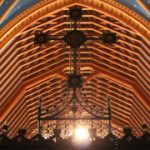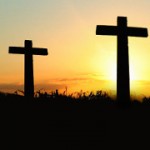Sermon preached by Kelvin Holdsworth on 2 June 2019
Vice Provost Search
St Mary’s Cathedral, Glasgow seeks an experienced priest for the post of Vice Provost. More details here.
Sermon preached by John Riches – 26 May 2019
Sermon preached by Dr. Debbie Lewer – Millport – 26 May 2019
Cathedral of the Isles, Millport, Isle of Cumbrae, Sunday 26th May, 2019.
Revelation 21.10, 22 – 22.5
‘And in the spirit the angel carried me away to a great, high mountain and showed me the holy city Jerusalem coming down out of heaven from God.’
In the name of the Creator, the Sustainer and the Redeemer, Amen.
I am an art historian. In my line of work I am used to looking at extraordinary things. But the book of Revelation is something else. It’s perplexing, terrifying, and beautiful. It is an apocalypse. That loaded word suggests all kinds of violent cataclysm in our troubled age. But more accurately and more expansively, apocalypse is a word that means ‘revelation’ – an unveiling, a showing of something previously not known, not seen. Something that makes all the difference in the world. Something we do not yet see.
The scripture passage for today, from the final chapters of Revelation, is all about being shown something by God, out of ordinary time and beyond the limits of our imagination.
John’s description of the New Jerusalem, shown him by the angel, is vivid. Our lectionary passes over the most ornate details of its jeweled opulence. But what strikes me most, more than the dazzling appearance, is that the New Jerusalem is a city and – a state of being – in which there is no need. It is not only that there is abundance, and fullness, and that all tears have been wiped away, but that even the most basic, existential needs are annulled. The eradication of need is so radical that it defies common sense. There is no need for a temple in the city, because the temple is the Lord God and the Lamb. There is no need, even for light, for sun or moon, because the glory of God is all light. There is no need for closed gates, because there is no night. No lamp will ever be needed again. God is there, and people will bring only glory and honour, and nothing that is false.
As I have been reading this extraordinary text this week, and thinking about how we understand need, I’ve found myself connecting it to something very down-to-earth, actually to a bit of my own art-historical research – on an entirely unrelated topic. I have recently been looking at shortages after the First World War, in Germany especially. In a time of deprivation, people devised all kinds of ingenious, if often inferior replacements for things – known as Ersatz objects and materials. Artists used these materials too, especially when they wanted to critique power and expose falsehood, which is precisely why they interest me. Ersatz is one of those German words that has gradually found its way in to our vocabulary. It means ‘substitute’, or ‘replacement’, especially when there is a lack of the preferred original. So, think of margarine, which originated as a substitute for butter, or coffee made from chicory. People have sometimes had to survive on bread made from straw, or sawdust, in the absence of grain. Think of girls who could not afford silk stockings drawing seam-lines on the backs of their legs, and the thousands of broken men who returned from war needing prosthetic limbs. There are substitutes in many of our own affluent lives too – from the fast food we gobble down when we’re too busy to share a proper meal, to the box-set dramas we follow instead of being disturbed by real relationships. We can all think of examples, and probably in our faith lives too.
But now, think of the most fundamental, basic things we need to live: the light from sun and moon, the waters of the sea, the temple, even, our religion, our church or our money. Imagine that for all of those things the time of need has passed. That they have been mere substitutes, margarine, if you like, at a time of scarcity, of want. That they, even sunlight itself, have been a mere Ersatz for a surpassing glory, original light, and a transformed state of being in complete wholeness, in no need at all.
It’s almost impossible to imagine. It doesn’t work. So much of life is beautiful and vivid, real and worthy. Creation and a just world, here and now, matter. The vision should sharpen our gaze on our world and its real need, not deflect it. So perhaps that is why the vision God gives John is a city without closed gates. A city in which healing and nourishment flow and grow from the water of life itself. A city where the need to protect our interests from others is gone.
The tree of life, we know, from the book of Genesis, was at the centre of paradise. In the New Jerusalem, its leaves are for all – for the healing of the nations. The great Jewish American critic George Steiner has said “there was, presumably, no need for books or art in Eden.” He went on to say that books and art were, however, indispensable from there on. We have needed books and art to communicate, as he put it, “a great hurt”.
So our human history starts to look like one long story of need, real and imagined, of things we use to soothe our hurt, and of gates closing, of people expelled from the garden, of others kept out of our cities, of borders and of the temple as a place sanctified and separate from secular life.
The visionary John was writing from his own isolated exile on the island of Patmos. He wrote to encourage a group of oppressed and struggling churches in Asia Minor. His extraordinary prophetic message of ultimate hope was addressed to their need as well as ours.
Revelation, with all its weird symbolism, scriptural codes, fantastic beasts and cosmic spectacle has long been the ultimate challenge to the artistic imagination. But more importantly, it is, perhaps literally, the ultimate challenge to people of faith, seeking to follow and to love God, and all God’s creation, here and now.
John’s vision of the end is a beginning and a theology of complete, radical liberation. If it all seems too remote for our busy cares and our complacent needs, here and now, then perhaps it was what the writer of a very humane 16th-century prayer, sometimes attributed to Sir Francis Drake, had in mind. This is part of it and it is as fitting an end as any:
“Disturb us, Lord, when
With the abundance of things we possess
We have lost our thirst
For the waters of life;
Having fallen in love with life,
We have ceased to dream of eternity
And in our efforts to build a new earth,
We have allowed our vision of the new Heaven to dim.”
So open our eyes, Lord, and disturb us.
Amen.
Sermon preached by Kelvin Holdsworth – 19 May 2019
Sermon preached for Easter Day 2019
News Release
FOR IMMEDIATE RELEASE
The Very Rev Kelvin Holdsworth, the Provost of St Mary’s Cathedral in Glasgow has spoken out against the Easter Day bombings in Sri Lanka and against the terrorist murder of Lyra McKee in Northern Ireland.
In his Easter Day sermon, he said:
“The answer to the world’s troubles does not lie in the fire of the bombers in Sri Lanka or the bullets of the terrorists in Northern Ireland.
“Light, life and love. These are the true way of the world. Death and destruction won’t win. Violence will never conquer. Death will never have the last word.”
Speaking to a packed cathedral, he spoke also of his personal sadness at the fire that ravaged the Cathedral of Notre Dame in Paris, which shares its dedication to the Mother of Jesus with St Mary’s Cathedral in Glasgow.
“I found the sight of Notre Dame burning extraordinarily upssetting. I’m sure that people across the world who are in the cathedral business were affected the same way.
“What might this generation accomplish that, faced with its destruction in nearly a thousand years would bring people out onto the streets to sing and to pray.
“What made the chaplain to the firefighters in paris run through fire to save the Blessed Sacrament and a relic that has been kissed by the faithful for the last thousand years.
“And what did one man do two thousand years ago that brings us up our of our beds and into this and another 37 million churches all over the world to sing and rejoice and proclain the extraordinary news – “He is not dead but is risen”.”
St Mary’s Cathedral Glasgow is one of the eight cathedrals of the Scottish Episcopal Church which has churches in every part of Scotland. The Very Rev Kelvin Holdsworth has been the Provost of St Mary’s since 2006.
The full text of the sermon can be read here: https://thurible.net/2019/04/21/sermon-for-easter-day/
Holy Week Services
Maundy Thursday – 18 April 2019
0930 Morning Prayer
1100 Said Eucharist (1970)
1930 Choral Eucharist with Washing of Feet and Vigil
Music – Mass in G Minor – Vaughan Williams
Good Friday – 19 April 2019
0930 Veneration of the Cross
1200 – 1500 Three Hour Devotions
preached by the Rt Rev Gordon Mursell
with music from cathedral musicians
1930 Choral Devotions with the Cathedral Choir
including
Hymns of the Passion from the Icelandic Tradition
Holy Saturday 20 April 2019
0930 Morning Prayer
1000 Church Spring Cleaning – jobs for everyone
Easter Day – 21 April 2019
0700 Easter Fire Vigil
1030 High Mass of Easter Day
Preacher – the Provost
Music – Langlais Messe Solennelle
1830 Festal Evensong



